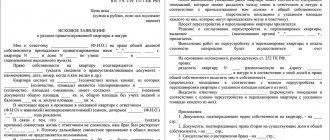Dividing property during a divorce can be one of the most stressful and contentious actions, second only to child custody issues. The question of how a privatized apartment is divided during a divorce is asked to a lawyer by all separating couples who have such housing.
Indeed, it’s difficult to figure it out on your own, since all real estate issues are resolved based on a variety of legislative acts, taking into account the norms described in the Insurance Code and the Civil Code of the Russian Federation. Also, Federal Law No. 1541-1 specifies the main provisions for the implementation of the privatization of state housing and municipal housing stock for social use in Russia.
Therefore, it is worth considering in detail the question of how privatized housing is divided during a divorce between former spouses and which of them can count on owning a common apartment.
Law on the division of a privatized apartment
The legislation provides for the right to use real estate on the basis of a social lease agreement, when the actual owner is the state or municipal authorities. Over time, such housing can be privatized with the complete transfer of property rights to a family or an individual.
This is a completely free procedure that allows you to become the owner of real estate. The procedure for dividing property rights will depend on the specifics of privatization.
Table No. 1 “Legal regulation of the issue”
| Name of the normative legal act | List of regulated issues |
| Family code | Part 2 art. 34 – all material assets acquired during marriage are recognized as joint property, regardless of whose name the property is registered in. Art. 38 – order of division of joint benefits |
| Civil Code | Art. 217 – the possibility of privatization of property by individuals is provided |
| Housing Code | Chapters 7 and – procedure and conditions for the use of real estate under a social tenancy agreement |
| Federal Law “On the privatization of housing stock” No. 1541 of July 4, 1991 | Section 2 – principles of privatization of housing facilities by individuals |
| Federal Law “On Privatization of Property” No. 178 dated December 21, 2001 | Features, procedure, methods of privatization of municipal and state property in Russia |
The essence of privatization
The term “privatization” in the issue of division of property has appeared recently.
Questions concerning this aspect are given in the RF IC and LC. In addition, a number of points are stipulated in the Federal Law number 178, as well as in the law number 1541-1. As for the definition itself (“privatization”), it means a type of transaction during which a property previously owned by the state (municipal property) came into the possession of a private person. After going through bureaucratic procedures, a person receives real estate for free (provided that he previously used a social tenancy agreement). Only one attempt is given for privatization. The owner can be one person or all family members (in equal shares). There are several ways to register a home, but when choosing an option, it is important to anticipate future actions in relation to the apartment.
Until the housing is privatized, state authorities act as the owner.
In such circumstances, divorce does not require division of property (this is impossible). In this case, neither spouse receives housing rights.
Rights to a privatized apartment
Whether the apartment will be divided during a divorce depends on when the privatization of housing was formalized. The second aspect that should be paid attention to is the participation of minor family members during the procedure for transferring property rights.
It is also necessary to pay attention to which family member wrote a refusal to privatize.
The owner is one of the spouses
There are two rules in law regarding the division of property during divorce. The first is material assets acquired after marriage registration - joint property of the spouses. The second is that property received through non-cash transactions by only one partner will not be divided during a divorce. Privatization is a non-cash transaction. In this case, everything will depend on the actions of the spouses.
If at the privatization stage one of the participants renounces property claims to the property, then in the future it will no longer be possible to claim part of the property.
Despite the lack of property rights, the partner will be able to continue living in the apartment. The social use agreement is valid indefinitely, regardless of the change of owner of the object.
Both spouses are owners
The order in which real estate is divided will depend on many factors. In practice, the following mechanisms and rules for implementing the procedure are known:
- Spouses are shareholders. A social rental agreement can be concluded with one family member or with all adult tenants. More often, at the privatization stage, documents on the transfer of property rights are prepared separately by each spouse. Upon completion of the process, the husband and wife become shareholders, that is, when registering property rights to the property in Rosreestr, each receives an extract from the Unified State Register of Real Estate, confirming the sole ownership of ½ share of the housing. In this case, there is no need to carry out additional division, since the object is already divided.
- Partners are co-owners. Privatization of real estate after registration of marriage without allocating specific shares automatically makes a man and woman co-owners. This means that each of them owns part of the housing, but which part exactly is not established by the documents. It is conventionally accepted that the partners’ shares in property rights are equal.
- Independent determination of shares by settlement agreement. Partners have the right to sign a notarial agreement, establishing who will get what share of the real estate.
- Judicial determination of shares. As a rule, the court proceeds from the equality of the spouses’ shares in the ownership of the apartment. It is extremely rare, but in practice it happens that during the distribution of a joint apartment/room, the court fixes different property shares. This may be due to a limited list of circumstances, as discussed below.
Children's participation in privatization
If a child was registered in the apartment, he must become a participant in the privatization. Moreover, this does not deprive him of the right to exercise the right to privatization again upon reaching adulthood.
If a child participates in privatization, he becomes a co-owner. This means that his share cannot be divided between parents. Just as a child cannot claim the personal property of his parents.
In the case where children did not take part in privatization, that is, only one family member became the owner, children will not be able to claim part of the apartment.
Is a gifted or inherited apartment divided when spouses divorce?
How is an apartment divided during a divorce if the owner is a husband or wife?
Division of property by mutual consent
A settlement agreement can be concluded between spouses if they have no disagreements regarding the division of property during a divorce, which includes a privatized apartment. It is important that it indicates that any disputes, disagreements and conflicts regarding the division of property are resolved in an amicable manner.
When it comes to dividing property, an attorney becomes a neutral third party who can guide the couple to resolve the issue amicably. Thus, having maintained good relations with your ex during the divorce, it is better to resolve all the nuances in the presence of a family lawyer, since such specialists have extensive experience in proceedings regarding the division of property.
When is it possible to divide the personal privatized apartment of the second spouse?
A personal privatized apartment is recognized as real estate acquired before or after marriage, when other family members renounced their claims to the object during the transfer of property rights. Therefore, it will not be possible to divide such an object.
Table No. 2 “Exceptions to the rules”
| Situation | Peculiarities |
| Marriage contract | The contract can be concluded between the participants before the wedding or after formalization of the official relationship. The content may indicate specific objects or it may refer to all objects that will be purchased in the future. |
| Settlement agreement on division of real estate | The document is prepared with the assistance of a notary when planning a divorce or after the end of a marriage. The parties can independently establish the procedure for dividing real estate:
|
| Court | If there are no legal claims to the property, the second spouse can still apply to the court to obtain part of the property. Possible results:
|
The role of the apartment privatization period during division
The rights of spouses to a privatized apartment directly depend on the moment of privatization:
- Before marriage. The apartment is personal property and is not subject to division.
- During the marriage, the spouses work together. Each spouse receives a share, which is his personal property and is not subject to division.
- During marriage with refusal of one of the spouses. The apartment is not divided, but the refused spouse can live in it for life.
- The spouses were not participants in the privatization and bought a privatized apartment during marriage. The property is considered jointly owned and is divided in half.
How to change or increase the share of property upon divorce
The division of a privatized apartment during a divorce can be challenged even in cases where there is joint ownership, which implies equal shares.
The grounds for filing a claim in court may be:
- disability of one of the spouses;
- presence of children under 18 years of age who live with their father or mother;
- a child with disabilities living with a husband or wife;
- a wife expecting a baby or on maternity leave;
- lack of wages or other income from one of the spouses for valid reasons.
All issues relating to certain circumstances are resolved in court. To prove something, you will need time and money for the services of a competent lawyer, but the result is worth it.
Voluntary division of a privatized apartment
Spouses have the right to independently determine the procedure for dividing the real estate after privatization in pre-trial or judicial proceedings.
Pre-trial procedure:
- oral establishment of principles for dividing property;
- drawing up a settlement agreement (on your own, with the help of a lawyer);
- contacting a notary who checks the document for compliance with the law and approves it.
Litigation: Once the trial begins, the parties have the right to draw up a settlement agreement. Algorithm for implementing the solution:
- drawing up a claim for division of an apartment;
- conducting negotiations with your spouse;
- making a decision on concluding a settlement agreement;
- drawing up a contract (either independently or with the assistance of a lawyer);
- transfer of the document to the court;
- obtaining a court-certified agreement.
The disadvantage of this option is the prohibition on re-applying to this court on the issue of division of the apartment. That is, it will not be possible to revise the section.
Privatization and minors
The situation is more difficult if minor children participated in the privatization. In this case, division is impossible (if the owners of the property are children). The apartment is their property, and they have the right to dispose of it at their own discretion. Another situation is possible when all family members or children and one of the spouses participated in the process. Here, minors have the right to count on certain shares, and the remaining square meters are divided between husband and wife.
If the property owner plans to change or sell housing after privatization, the consent of the second spouse is not necessary. The funds received from the sale are used at the discretion of the owner, without the consent of the husband (wife).
The procedure for dividing a privatized apartment in court
If it was not possible to resolve the conflict peacefully, only a district court of general jurisdiction will help. You must contact the authority located at the address of the real estate property.
You can initiate a resolution of a property dispute before a divorce, at the stage of divorce, or after receiving a divorce certificate. A husband or wife interested in receiving part of the property can file a claim with the court.
Documents and state duty
In addition to the statement of claim, you must have the following documents with you:
- a copy of the applicant's passport;
- extract from the Unified State Register of Real Estate;
- privatization agreement;
- a copy of the defendant's passport;
- receipt of payment of state duty;
- technical documentation for the property;
- conclusion of the assessment of a real estate property.
The state duty is established by articles of the Tax Code of the Russian Federation. The amount of deductions is calculated taking into account the price of the claim, that is, the estimated value of the disputed property. The plaintiff pays the state fee, but in the statement of claim you can indicate a request to divide the state fee with the defendant, taking into account the received shares of real estate.
You can learn more about the amount of state duty on property claims here.
Terms and procedure for consideration
The minimum period for making a decision on a dispute is 2 months. During this time, the court must evaluate the evidence presented and make a final decision.
An additional 30 days are allotted for the verdict to enter into legal force. This is the deadline for filing an appeal.
Judicial practice and judges' decisions
An analysis of judicial practice shows that in most cases a privatized apartment, if obtained after marriage, is divided in half. If we are talking about the premarital acquisition of property, then the maximum that the second partner expects is the right to temporary use of the property.
An example of the division of a privatized apartment from practice:
Citizen O. privatized an apartment in 2015, which he used as a social lease. In 2021, O. married citizen S. A marriage contract was not drawn up. In 2021, the couple filed for divorce and decided to immediately consider property disputes regarding the division of joint property.
The defendant, citizen S., filed a counterclaim with a request to divide the privatized apartment, citing the fact that cosmetic repairs had been made to the housing during the marriage. The woman provided receipts for expenses. The amount of money invested was 95,000 rubles.
The court refused to divide the property, since the invested amount was not significant and the market price of the property did not change due to repairs. Instead, the judge issued an order for the wife to temporarily reside in the apartment. The deadline for moving is 3 months from the date of entry into force of the court decision.
What's next?
After the divorce process is completed and the housing is divided into shares (by agreement or by decision of the court), each family member has the right to act at his own discretion - change, sell, donate or rent out real estate.
The main rule is preliminary coordination of such actions with other family members (those who have a share in the apartment). The husband (wife) who did not participate in the privatization process can count on long-term (indefinite) residence. The decision is made taking into account the circumstances that prevailed between the spouses at the time of the divorce. To retain the right to use real estate, two conditions must be met:
- The apartment was privatized during the period when the husband and wife were still living in an official (legal) marriage.
- The husband (wife) is registered in the premises and officially refused privatization, but reserved this right for the future.
If the specified conditions are met, a family member who is not the owner receives the right to live in a privatized apartment indefinitely. Eviction is possible only through the involvement of a judicial authority. In the case where it is still not possible to divide the housing, it is necessary to determine the rules and nuances of using the property. Another option is to demand eviction and not interfere with the use of real estate.
If the court recognizes that the apartment belongs to only one family member, the second spouse loses the right to the property (including residence in it). As noted above, the court may approve temporary residence in an apartment for a certain period of time if the second spouse does not have options to move.
Lawyer's answers to questions about the division of a privatized apartment
After the divorce and division of the privatized apartment, the husband stopped paying utility bills. What to do and where to go?
The spouse is required to pay his share of utilities, but only for those resources that he uses or that are used to support his share of the apartment. If a debt arises, the spouse should not contribute money for her husband. In case of formation of a large debt, it is necessary to apply to the district court with a statement of claim.
How to divide a personal account for housing and communal services in a privatized apartment after a divorce?
Splitting the account is allowed only if the partners have divorced, registered shared ownership of the property and continue to live on the premises. Initially, the HOA, management company or housing and communal services are involved in the procedure (depending on how the apartment building is managed). Shareholders submit separate handwritten applications with a request to split the payment. If the manager refuses to comply with the request, then the interested spouse can and should file a claim in the district court.
How to divide non-privatized housing
The law states that in a divorce, community property must be fairly divided.
However, time after time, divorcing couples turn to lawyers with the question of how a non-privatized apartment is divided and whether privatization of real estate is possible after a divorce. It happens that an apartment is provided by an enterprise where one of the spouses works, but it is registered for two, and both also have registration. In a few years, the couple may separate, but the apartment will remain non-privatized. In such a situation, most often one of the spouses moves to another place of residence, remaining registered at the old address. What to do with your share if the husband or wife tries to write their ex out of non-privatized housing? This “picture” emerges quite often.
Indeed, the court can make a judicial decision on the loss of the right of residence of one of the spouses, since the living space is not privatized.
Legal advice: you need to try to go through the privatization procedure before or during the divorce, agreeing with your former partner on the equality or inequality of shares.
Privatization of housing after divorce is not yet a very common practice, since it requires the collection of a large amount of documentation, certificates and evidence. A privatized apartment after a divorce is easier to divide when the spouses do not have children or if a marriage or settlement agreement has been drawn up.
The court will help make the final decision on the division of property, but the couple or their lawyers can, even before the trial, discuss the issue of property valuation and an amicable method, taking into account the norms prescribed in the current legislation. This can be the most emotionally difficult part of the divorce process.
Features of dividing an apartment during divorce
When dividing an apartment, there are many factors that will affect both the division procedure and its final result.
If the apartment is registered to the husband
Regardless of who exactly the property acquired during marriage was registered in, it is considered joint. The following are exceptions to this rule:
- The apartment was given to my husband as a gift. But the husband must prove that the housing was not given to the married couple, but to him personally; the proof will be a deed of gift for the apartment.
- The husband inherited the living space.
- Housing was purchased during marriage, but with the husband’s personal funds. In this case, he will have to prove that only his personal funds were used to purchase the residential premises, for example, bank deposits that he had before marriage or proceeds from the sale of property that also belonged to him before marriage.
But if the husband decides that he should get the apartment only because his wife was on maternity leave and did not work, and he earned all the money to buy the home, then no court will meet him halfway.
If the apartment is registered to the wife
The same rule applies if the housing is registered in the name of a former spouse. If it was purchased during the marriage, it is considered joint property. The exception, as in the first case, is the fact of receiving residential premises as a gift, inheriting them or purchasing them with the wife’s personal funds, in which case she will remain the sole owner of the apartment.
If there are children
The Family Code defines the principle of division of property between parents and children. According to it, parents cannot lay claim to the property of their children, just as children cannot lay claim to the property of their parents.
If a child has a share in the parents’ apartment, then during a divorce and subsequent division, the child’s share goes to the parent with whom the child remains and the other spouse has no right to it.
In those cases where a minor does not have a share in his parents’ residential premises, the law retains his right to use housing even after a divorce. A child cannot be left homeless in any case; this would be a violation of his rights.
When dividing real estate in families where there are minors, the question often arises: is it possible to increase the share of the spouse with whom the children remain at the expense of the share of the second spouse? According to the law, children cannot claim the shares of their parents, so the division must take place according to the shares of the married couple, but in accordance with the RF IC there are several grounds for deviating from the equality of shares of former spouses, among them the presence of joint young children.
To do this, the spouse with whom the children remain has the right to apply to the judicial authorities to deviate from the rule of equal shares in the interests of joint minor children. But, in any case, the court will divide the living space at its own discretion: it has the right to increase or decrease the shares of the spouses depending on the circumstances, but is not at all obliged to do so.
Home purchased before marriage
Housing purchased before marriage, as well as those given as a gift or inherited during any period of marriage, the Civil Code of the Russian Federation recognizes as personal property, which is not divided during a divorce (Clause 2 of Article 256 of the Civil Code of the Russian Federation)
One could put an end to this if there were numerous nuances.
For example, even before marriage, Nikolai purchased a two-room apartment, into which his wife Elena also moved after marriage. Immediately after her marriage, she started a high-quality renovation of the living space, remodeled it, changed all communications and plumbing, installed plastic windows and a metal entrance door. Elena borne all the costs of repairs herself, from the personal money she received from the sale of her room in a communal apartment. Due to reconstruction, the market value of the apartment more than doubled.
Five years later, the couple divorced, but Nikolai did not agree to share the apartment, since he was sure that Elena did not have any rights to it, since he bought the apartment before his marriage.
Elena filed a statement of claim in court, where she petitioned for payment of monetary compensation in the amount of the cost of the money she spent; as evidence, she attached an extract from a bank account, an agreement for the provision of services by a repair organization and checks for the purchase of building materials. The court satisfied her demands in full.
The legislation does not establish a complete list of situations in which personal property will be recognized as joint property when dividing property; the court must make a decision independently.
Legislation
The conditions and procedure for dividing a privatized apartment are regulated by the following regulatory legal acts:
- Law No. 1541-1;
- Civil Code of the Russian Federation;
- Family Code of the Russian Federation.
The provisions of these documents will be used by spouses for the division of common property on a voluntary basis, as well as during the legal process for the forced division of common property.
We recommend that important decisions related to real estate be made only after consultation with an experienced lawyer. Any mistake can cost you the loss of property and money, and solving the problems that arise may be impossible by legal means.
If there are minors
If a family has common children, their rights and interests must be taken into account when dividing the property of citizens. Problems will not arise if children participated in privatization on equal rights. But what if the child was born after registration of ownership of the apartment?
In this case, Art. 39 of the RF IC allows the court to deviate from the principle of equality of parties during division, taking into account the interests of minor citizens. In practice, if after a divorce the child remains to live with one of the parents, the spouse’s share will be increased.
Important: The law does not determine the specific conditions and size of the increase in the share; this will be decided in court. We advise you to consult our lawyers to clarify the possible options for handling such cases in court.
The court decision on division will not provide for the allocation of part of the property for the child, since the subject of the dispute is the property relations of the spouses. However, after the division of the apartment, nothing prevents the child from registering part of the property received after the division.
Is it possible to divide an apartment after a divorce?
If the apartment is joint property, then the answer will be clear: yes, it is possible. But only property that was purchased with joint funds during the marriage is subject to mandatory division. All funds received from the income of a married couple are considered joint, with the exception of those funds received:
- each spouse before marriage;
- married, but for special purposes (maternity capital, cash payments to the liquidators of the Chernobyl disaster, etc.);
- as a gift, as an inheritance.
The fact that one of the spouses, while married, did not work (for example, the wife did housework and raised children) does not play any role in the division, unless, of course, one of the spouses spent family funds to the detriment of the couple (for example, lost or drank).
Not subject to division
If the apartment was privatized by one of the spouses even before the legal marriage, and the second simply moved into it after the wedding, then it will not be possible to divide it during a divorce. It will remain the personal property of the spouse participating in the privatization.
The maximum that the court will do is determine the period during which the spouse who did not participate in the privatization will be able to live in this apartment until he can move to another place of residence. There are two conditions here: he is officially registered in this apartment and he has no other housing. An important factor influencing the court's decision may be whether the spouses have children together.
Even if the apartment was privatized by the spouse during family life, and the rest of the family members refused to take part in the privatization in his favor, it will be the personal property of this spouse. Neither the wife (husband) nor the children will be able to claim it in the event of a divorce.
The law accommodates family members who voluntarily refused privatization - they have the right to live in such an apartment for as long as they wish, but will not be the owners. Therefore, they will not be able to sell it, exchange it, or perform other legal actions. This creates certain difficulties for both the homeowner and his family members. The first will not be able to sell this apartment, since his spouse has legal grounds to live in it, and the second will not be able to dispose of it, but only use it as a roof over his head.
Features of privatized housing
If citizens live in an apartment or house under a social tenancy agreement, they must be prepared for the fact that they will not be able to fully dispose of this property at their own discretion. This means that such people do not have the right to carry out legal transactions with housing. They cannot sell it, donate it, etc. And in the event of a divorce, division of an apartment in this status is impossible.
However, such living space can be privatized. Federal Law No. 1541-1 establishes that privatization is a procedure in which a state or municipal apartment can be transferred into the ownership of the citizens living in it. It is carried out free of charge. The following have the right to participate in privatization:
- a person who appears in the status of an employer;
- members of the tenant's family living in the apartment. The exception is children under 14 years of age, who must be included in the privatization agreement regardless of their place of residence, if their parents are involved in it;
- citizens who have permanent registration in the privatized apartment.
Every citizen of the country has the right to take part in privatization. But the law allows it to be implemented only once.
Consultation with a lawyer on the division of property
When dividing property, the help of a specialist is often required. Such cases are always associated with emotionality - after all, you have to resolve property issues with a person who was once a relative, and now acts as an opponent in the dispute. In such disputes, the assistance of a lawyer or advocate is never superfluous.
How can a lawyer help you during a divorce and after?
A lawyer or family law attorney provides the following types of services:
- assessment of possible risks;
- detailed study of the case;
- providing advice regarding the prospects of the case;
- drawing up a statement of claim;
- filing a counterclaim;
- providing information about the prospects of the case;
- collection of evidence;
- initiation and organization of examination;
- organizing an independent assessment of property;
- filing documents with the court;
- taking part in preliminary and court hearings;
- conduct of negotiations;
- ensuring compliance with the law and the interests of the principal in the process of procedural actions;
- submission of petitions and other documents;
- appealing a court decision;
- assistance at the stage of enforcement proceedings.
If the issue of division is resolved amicably, the lawyer will help draw up an agreement or analyze the existing option for compliance with legal regulations and the interests of the client. After completing the agreement, the lawyer will help you register the transfer of ownership.
Cost of a lawyer for divorce
The cost of legal services depends on the complexity of the case. The final amount that will need to be paid will be announced by the lawyer after studying all the materials as part of the consultation.
The average price for legal services is as follows:
- preparation of a statement of claim – from 5,000 rubles;
- preparation of applications – from 2,000 rubles;
- judicial protection – from 30,000 rubles;
- pre-trial dispute resolution – from 12,000 rubles;
- filing an appeal/cassation complaint – from 3,000 rubles;
- travel to a preliminary hearing or court hearing – from 8,000 rubles;
- development of a marriage contract or agreement on division of property – from 5,000 rubles.
You can find out the approximate cost of solving a turnkey case by calling the specified phone number.
| Services of lawyers and advocates | Price |
| Initial free consultation (up to 30 minutes) | FOR FREE |
| Consultation in writing | from 2000 rub |
| Drawing up an application for a court order | from 1000 rub |
| Drawing up the necessary documents: claims, complaints, requests | from 3000 rub |
| Representation in court | from 5000 rub |
| Turnkey legal protection: from claim to victory | from 15,000 rub. |
| Appeal, defense in a higher authority | from 3000 rub |
| Assistance in the execution of a court decision | from 3000 rub |
Choosing a Lawyer and Advocate for Divorce
To choose the best specialist, it is advisable to use the following tips:
- Don't skimp on a lawyer/attorney.
In matters related to property, you should not skimp on a lawyer, as there is a risk that the losses will be disproportionate. If you want to spend as little money as possible on legal protection, there is a risk of encountering amateurism or not receiving a package of services. In addition, an initially low price does not guarantee that additional charges will not arise in the future.
- Do not contact a lawyer if he guarantees a positive outcome of the case.
During the process of dividing property and dissolving a marriage, additional details or circumstances unknown to the parties may appear. Things like this sometimes change the course of things completely. For this reason, a good lawyer never gives 100% guarantees. If you are guaranteed success at the first consultation, you should stay away from the specialist. Most likely, this is a scammer or an amateur.
- Do not cooperate with a lawyer if he cannot speak convincingly.
The speech of a good lawyer should be beautiful and well-reasoned. He must be able to persuade, because the main weapon of any lawyer is eloquence.
- Choose a lawyer who has assistants.
Well-coordinated teamwork produces more results than someone working on their own. Family matters can be very complicated and often cannot be done with the help of one lawyer. It is best to contact a law firm that employs specialists in various fields.
- Choose a lawyer with a narrow specialization.
If you want a qualified lawyer to accompany your divorce process, choose a lawyer with a narrow specialization. If you have several cases in one direction that were successful, there is a greater chance that he will help you too.







